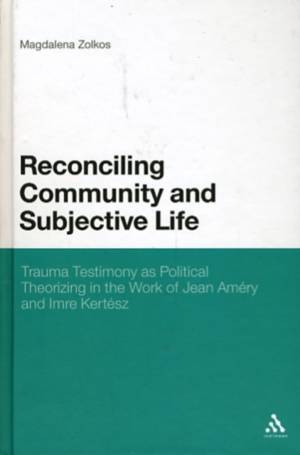
- Afhalen na 1 uur in een winkel met voorraad
- Gratis thuislevering in België vanaf € 30
- Ruim aanbod met 7 miljoen producten
- Afhalen na 1 uur in een winkel met voorraad
- Gratis thuislevering in België vanaf € 30
- Ruim aanbod met 7 miljoen producten
Zoeken
Reconciling Community and Subjective Life
Trauma Testimony as Political Theorizing in the Work of Jean Amry and Imre Kertsz
Magdalena Zokos, Magdalena Zolkos, Magdalena Z[kos
Hardcover | Engels
€ 339,45
+ 678 punten
Omschrijving
This is an examination of the difficult interplay between the collective pursuit of justice and reconciliation on one hand and the individual subjective experience of trauma on the other, proposing that it be thought as a potentially productive tension. To do so, Zolkos looks at how texts from Jean Amry and Imre Kertsz speak to the question of the politics of the past and, ultimately, to the post-foundational notions of community and justice. The text works with issues of reconciliation at a theoretical level that bring together insights from political theory, trauma studies, holocaust studies, history and literary theory. The book has the greatest relevance for the critical reconciliation theory, as well as for those working on the concept of community within the continental tradition.
Specificaties
Betrokkenen
- Auteur(s):
- Uitgeverij:
Inhoud
- Aantal bladzijden:
- 256
- Taal:
- Engels
Eigenschappen
- Productcode (EAN):
- 9780826431141
- Verschijningsdatum:
- 8/04/2010
- Uitvoering:
- Hardcover
- Formaat:
- Genaaid
- Afmetingen:
- 155 mm x 231 mm
- Gewicht:
- 476 g

Alleen bij Standaard Boekhandel
+ 678 punten op je klantenkaart van Standaard Boekhandel
Beoordelingen
We publiceren alleen reviews die voldoen aan de voorwaarden voor reviews. Bekijk onze voorwaarden voor reviews.








